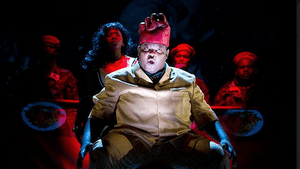Stay in the Loop
BSR publishes on a weekly schedule, with an email newsletter every Wednesday and Thursday morning. There’s no paywall, and subscribing is always free.
A classic made contemporary
Philly Fringe review 2016: Third World Bunfight's 'Macbeth' (first review)

Orson Welles became famous at the age of 20 when he directed a production of Shakespeare’s Macbeth set in Haiti and using an all-black cast. His interpretation, nicknamed “the voodoo Macbeth,” was a critical and box-office hit in New York and on tour.
Its final scene is preserved here.
Macbeth meets Mobutu
Eighty years later, Brett Bailey and his South African troupe Third World Bunfight, in a coproduction with Opera Philadelphia, have taken the Scottish play and transplanted it to the Democratic Republic of the Congo with an all-black cast. He also used the Italian Macbeth libretto written by Francesco Maria Piave and music composed by Giuseppe Verdi for the Florence Opera in 1847. Bailey’s troupe then re-arranged the music for African rhythms and instruments. While the words were sung in Italian, the projected text was translated into contemporary English that referenced colonialism and the usurpation of power by a strongman called Colonel Macbeth, who is prey to superstition.
The rivalry of Scottish clans has been replaced by tribal warfare between Hutus and Tutsis, which caused more than five million deaths, and drove two million people to flee as refugees.
Cut as if with a sharp machete to 90 minutes, this production eliminates many characters. It focuses on Macbeth, his wife and their co-dependency as they claw their way to power, use slave labor to loot gold and tantalite mines, and then try to avert the fatal ending foretold by witches.
I am a traditionalist who normally resists radical change. One of my favorite Verdi melodies is the joyous march that the composer wrote as the finale, where the chorus sings “Macbeth, Macbeth ov'è/Dov'è l'usurpator” (basically, “And now, Macbeth is dead/ At last, Macbeth is dead”). Bailey and musical director Fabrizio Cassol cut that out and replaced it with a repeat of the sad, slow chorus “Patria oppressa” (“Oppressed homeland”) that Verdi composed for Scottish refugees at the beginning of his last act.
This production also used a portion of the Oppressa melody in place of Verdi’s overture. It clearly was the theme of this interpretation.
No happy ending
I have to admit that the new ending is more appropriate. I am satisfied to say goodbye to my happy march as I am moved by the apt parallel with central Africa and its ethnic conflict, ruthless militia, atrocities, and plundering of minerals. I even suspect that Verdi, if he had adapted this Shakespeare play in his mature years (as he did four decades later with Otello and Falstaff), might have chosen to end on this tragic note.
The leads were legitimate singers from the Capetown Opera. Nobulumko Mngxekeza as Lady Macbeth sang better than I’ve seen and heard in that role at major European and U.S. houses. Owen Metsileng, who describes himself as a tenor, was strong in the baritone role of Macbeth, with gleaming top notes. Otto Maidi was a sympathetic Banquo. The seven-person chorus sounded much more powerful than you’d expect from its numbers.
Some of the highlights of this version displayed Verdi’s melodies and rhythms relatively untouched, as in Banquo’s aria, Macbeth’s two last-act arias and, especially, Lady’s sleepwalking scene.
The banquet scene made a particularly vivid impression with almost no change of Verdi’s notes, as Lady Macbeth sensuously rolled her hips in tempo to “Nasca il diletto, muoia il dolor” (“Give birth to life, death to sorrow”).
Emotions were invoked by the projected images of African atrocities, the faces of widows and orphans, and by the tossing of dolls that simulated the bodies of babies.
Some critics will object to the juggling of scenes and musical pieces (for example, Macbeth sings of “Tomorrow and tomorrow and tomorrow” before his wife dies) but this is quibbling. This production is both thoughtful and moving as it relates the work of Shakespeare and Verdi to our time.
To read Trish McFadden's review, click here.
What, When, Where
Macbeth. Adapted by Fabrizio Cassol from Verdi’s opera and Shakespeare’s play. Conceived, designed, and directed by Brett Bailey. Premil Petrovic conducted. Co-production with Third World Bunfight and Opera Philadelphia in cooperation with FrangeArts. Through Sept. 25, 2016 at the Prince Theater, 1412 Chestnut St., Philadelphia. (215) 732-8400 or operaphila.org.
Sign up for our newsletter
All of the week's new articles, all in one place. Sign up for the free weekly BSR newsletters, and don't miss a conversation.
 Steve Cohen
Steve Cohen